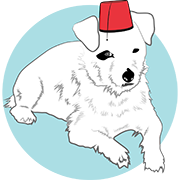 If you’re like me, you have been missing the always insightful posts of Deborah Flick at Boulder Dog. Deborah has blogged occasionally, but wrote back in June that she was going to be busy studying at the Karen Pryor Academy and would return to more regular blogging when she completed the course.
If you’re like me, you have been missing the always insightful posts of Deborah Flick at Boulder Dog. Deborah has blogged occasionally, but wrote back in June that she was going to be busy studying at the Karen Pryor Academy and would return to more regular blogging when she completed the course.
Being the impatient person I am, I didn’t want to wait to find out how the course went until she got around to sharing her experience. Besides, how did I know she was going to address all of my specific questions? So I just asked her what I wanted to know — it helps that she’s a friend — and she was nice enough to answer.
EJ: I’m going to be honest: Karen Pryor is one of those names in the animal training world that I know but I’m not sure precisely why. Can you explain who Karen Pryor is and tell me something about her academy — when it was established, what its goals are?
DF: I hadn’t heard of Karen Pryor either until about five years ago. Sadie was a very fearful puppy and I was freaking out. I called on Nana Will, the trainer who had helped me with my previous dog, Morgaine. I hadn’t seen Nana in over fifteen years and during that time she had ‘crossed over’ from compulsion to reward-based training. I have huge respect for Nana. She’s a brilliant trainer. So, when she told me to read Jean Donaldson, Ian Dunbar, Patricia McConnell, David Mech, and, of course, Karen Pryor’s classic book, Don’t Shoot the Dog, I did. Nana also regaled me with stories about Bob and Marian Breland Bailey of ‘chicken camp’ fame. Nana had studied with the Baileys for several years.
Karen Pryor’s approach to dog training is based on the innovative work of Keller Breland, Marian Breland and Bob Bailey. Its hallmarks are: 1) breaking complex behaviors down into simple, teachable component parts, 2) using a behavior marker, usually a clicker, and 3) positive reinforcement. Keller and Marian Breland worked with B.F. Skinner as graduate students in the 1930s and went on to form a business, Animal Behavior Associates, in the 1940s. They trained all sorts of animals to do all sorts of things for all sorts of clients from the US Navy to General Mills.
The Brelands also were teaching their new approach to animal training to marine mammal trainers at places such as Sea World and Busch Gardens, among others. Bob Bailey, previously the director of the Marine Mammal Program at Pt. Magu, California, went to work with the Brelands in 1965 and subsequently married Marian some years after Keller died.
By the 1990s, after Marian and Bob had ‘retired’ from animal training, they were enlisted by people in the dog training field, including Karen Pryor, to teach the mechanics of their training method to dog trainers using chickens. Since Marian’s death, Bob has continued to teach chicken camps for animals trainers from around the world. I attended his chicken camp in Sweden in May just weeks before starting my studies with KPA.
Karen Pryor Academy was founded by Karen Pryor Clickertraining, and launched nationally in 2007 with training centers in 9 states and Ottawa, Canada, with 13 locations across North America.
According to the KPA website: Karen Pryor Academy was borne of the many requests KPCT received from trainers who wanted help setting standards for good training practices and help making trainers more financially successful.
What attracted you to the Karen Pryor Academy?
First and foremost, I was interested in learning the finer points of reward-based training using a behavior marker or clicker. Second, I wanted an in-depth experience. Third, I didn’t want to travel long distances to attend a class. Fourth, I wanted to be in a ‘real’ class with other students. I didn’t want a remote, on-line course.
I considered several other dog-training programs, and I interviewed three KPA graduates about their experiences. I think what clinched it for me was that KPA came to Boulder.
What were your goals in attending?
I wanted to delve deeper into the theory and practice of positive reinforcement training, and I wanted to improve my skills. I wanted to feel more confident and accomplished as trainer. I wanted to learn a way of thinking through training conundrums. I wanted feedback.
***
Did she get it? Stay tuned for Part 2.
 Deborah Flick, Ph.D. is a communication consultant and president of her own company, Collaborative Solutions Group. She is also the author of an award winning book, From Debate to Dialogue. She has been writing for her blog, Boulder Dog (www.boulderdog.net) since April, 2009. In September 2011 Deborah graduated from Karen Pryor Academy for Animal Training and Behavior.
Deborah Flick, Ph.D. is a communication consultant and president of her own company, Collaborative Solutions Group. She is also the author of an award winning book, From Debate to Dialogue. She has been writing for her blog, Boulder Dog (www.boulderdog.net) since April, 2009. In September 2011 Deborah graduated from Karen Pryor Academy for Animal Training and Behavior.

Hi Edie
Thank you so much for this opportunity to talk with you about Sadie and my experiences at KPA. I thoroughly enjoyed answering your questions.
My pleasure!
How cool! Going to bookmark the Boulder Dog blog! 🙂
I have been enrolled in a new online Clicker Training course – http://www.cyberdogonline.com (for dog owners rather than pros) and wrote about this on Boogie”s blog – http://boogiebt.wordpress.com/2011/08/26/sneak-peek-cyberdog-online-clicker-training-course/ The teachers are Karen Pryor Academy certified training partners.
Oh, how neat! If I had the cash I would absolutely love to apply to the Karen Pryor Academy, so it’s a big thrill for me to read about it like this!
Can’t wait for the next installment!
Your wish is my command, Debbie. It’s going to be posted tomorrow!